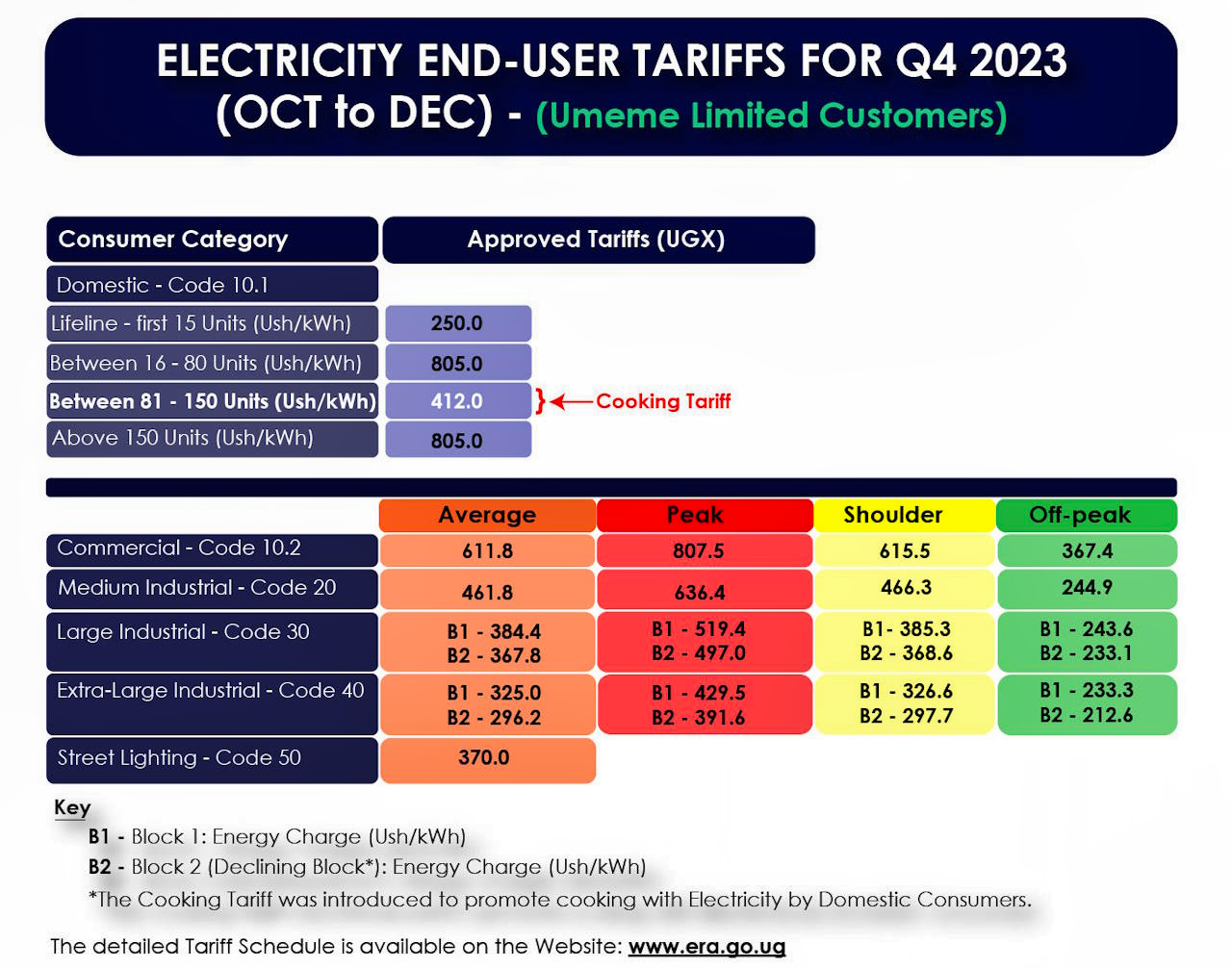The strengthening of the Ugandan shilling against the US dollar offset increases in core consumer prices and global crude oil prices, resulting in no adjustment to electricity rates for the fourth quarter of 2023.
The Electricity Regulatory Authority left retail tariffs charged by Umeme, the country’s largest power utility, unchanged from the third quarter – the second time this year it has done so. The regulator last revised tariffs earlier this year when it cut prices for the second quarter by a weighted average of 1 per cent.
Personal (domestic) consumers who use more than their 15 subsidised ‘lifeline’ units (kWh) per month, charged at Shs250, are charged Shs805 per unit (the lifeline tariff applies only to domestic consumers whose average monthly consumption over the past six months is less than 100 units). However, above 80 units per month, a lower rate of Shs412 per unit applies for up to 150 units; this falls under the ‘cooking tariff’ introduced in 2022 to encourage cooking with electricity.
Meanwhile, commercial customers will be charged an average of Shs611.8 per unit. The average tariff for medium industries remains at Shs461.8, while large industries continue to be charged Shs384.4 per unit and extra-large industries at an average of Shs325. The street lighting tariff also remains unchanged at Shs370.

Umeme is a regulated monopoly that distributes more than 90 per cent of the electricity sold by the Uganda Electricity Transmission Company Limited, the country’s sole bulk electricity supplier. However, its concession does not permit it to set electricity prices for end users; that responsibility was left to the sector regulator.
The optimal tariff should reflect the true cost of providing electricity to each consumer category, and balance the interests of both consumers and sector operators (and government). The ERA follows the so-called “cost of service” approach to tariff setting, based on the notion that each company’s tariff income should cover its targeted revenue requirement. The revenue requirement – reviewed annually by the ERA – should be sufficient to cover operating costs and provide for a return on invested capital.
At the beginning of each year, the regulator announces a base tariff for Umeme customers based on its estimates of future costs, investments and target levels of electricity distributed and sold. This tariff is then adjusted quarterly to reflect changes in the three macroeconomic variables that have the greatest impact on sector prices – fuel prices, exchange rates and underlying consumer inflation.
In addition to the tariffs, Umeme customers are subject to other charges. These include 18 per cent VAT on every payment – the first deduction on every payment you make – and a monthly service fee of Shs3,360. If you haven’t paid the monthly service fee yet, it will be deducted after VAT. The remaining funds will then be used to purchase electricity units.
If you qualify for the lifeline tariff – the subsidised low-volume electricity tariff for low-income households – your first purchase after paying VAT and service charges will be the 15 units at Shs250. Purchases above the 15 lifeline units will be charged at the prevailing quarterly tariff – which for the three months to the end of 2023 is Shs805 per unit for domestic consumers who have not exceeded 80 units.
The service charge of Shs3,360 is levied only once a month. If you purchase electricity again within the same month, the service charge will not apply. In case you do not purchase electricity for more than a month, the accumulated service charges will be recovered with your next purchase.
The same principle applies to subsidised units, which you can only access with your first monthly purchase. If you do not purchase electricity for more than one month, the accumulated subsidised units will be applied to your next transaction.
VAT, however, is calculated and deducted from each purchase.






